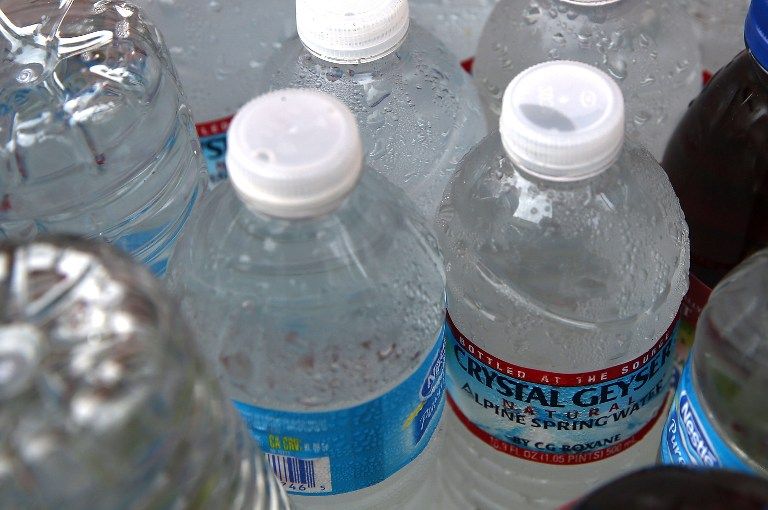Singapore's $134m Bottled Water Addiction
Published on by Water Network Research, Official research team of The Water Network in Social
How did bottled water grow into a multimillion-dollar industry in a country with perfectly safe drinking water from the tap?

In a country where tap water quality far exceeds minimum World Health Organization (WHO) and US Environmental Protection Agency standards, it may come as a surprise to some that bottled water is a booming, multimillion-dollar business.
Consumers splashed out about S$134 million on still bottled water in 2015, up 24 per cent from five years ago, based on data from research firm Euromonitor International.
While some of these bottled water products are derived from mineral-rich springs, a significant number - including market leaders like F&N’s Ice Mountain and Coca-Cola’s Dasani - are sourced from public water supplies. These two brands made up more than half of the bottled water sales volume in Singapore last year, according to Euromonitor data.
When contacted, F&N confirmed that Ice Mountain sold in Singapore “is sourced and packed in Malaysia from tap water”, while Coca-Cola said that Dasani produced for the Singapore market comes from “the local water supply at (its) facility in Malaysia”. Both companies also said they have multiple purification processes in place, which distinguishes their “pure drinking water” from tap water.
A situation where people are willing to pay as much as a thousand times more for bottled water when clean, drinkable tap water is readily available at a nominal charge has left some environmental advocates and experts scratching their heads.
Some, like Ambassador-at-Large Professor Tommy Koh and the Lee Kuan Yew School of Public Policy's (LKYSPP) Assistant Professor Leong Ching said that people may not be sufficiently aware of the tap water origins of some bottled water products. Others, like Nanyang Technological University's (NTU) Ng Wun Jern and National University of Singapore's (NUS) Professor Ong Choon Nam believe that people consume bottled water primarily out of convenience.
ADDICTED TO CONVENIENCE: IS BOTTLED WATER A NECESSARY EVIL?
A 600ml bottle of drinking water usually retails for about S$0.50 to S$1. According to PUB, the same amount of tap water only costs 0.1 cent, making it 500 to 1,000 times cheaper than bottled water. This price differential, while significant, is not sufficient to motivate consumers to move more to tap water, said Prof Ng, who is the executive director of the Nanyang Environment & Water Research Institute at NTU.
The relatively low retail cost of bottled water also appears to be a small price to pay for the convenience of not having to carry a bottle around to be refilled, said Prof Ong, director of the NUS Environmental Research Institute. “It’s hard to convince people that they don’t need to be spending the money they spend on bottled water, because (at) S$1 a bottle, that’s cheap to many.”
The result is a "use-and-throw" bottled water habit. This is “a price that society pays for being highly mobile and always on the move”, said Mr Melvin Leong, associate director of Energy and Environment at Frost and Sullivan, adding that the need for convenient and immediate access to water is a universal one, regardless of a country’s tap water quality.
In addition, this S$1 price, according to Singapore Management University’s Seshan Ramaswami, is not usually referenced against what tap water would cost, but what a soft drink or iced tea would cost in a hawker centre or food court, and “bottled water (in these instances) is often the cheapest, and healthiest of all drinks”.
The Associate Professor of Marketing Education also noted that apart from factors like convenience and price, bottled water also appeals to short- or long-term foreign residents, who “just do not have knowledge of, or faith in the potability of tap water anywhere else, including Singapore”.
Meanwhile, Euromonitor analyst Andrea Lianto said that in spite of awareness of the potability of tap water here, some consumers have become more concerned about health issues surrounding tap water consumption, such as “the hygiene of the water ducts and pipes”.
When these concerns were relayed to PUB, it told Channel NewsAsia that Singapore has “a comprehensive and rigorous maintenance, servicing and monitoring programme which covers the entire water system, from reservoirs to waterworks, through the distribution network, to the end consumer’s tap”. This ensures that the tap water is “clean and wholesome”, it said.
PUB also added that the pipes used in Singapore’s potable water supply “are primarily cement-lined ductile iron and steel water mains” that comply with international standards.
Source: Channel News Asia
Media
Taxonomy
- Water
- Water Supply
- Food & Beverage
- Non-Alcoholic Beverages
- Bottled Water